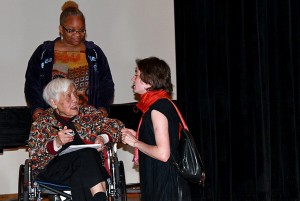Civil rights activist and author Grace Lee Boggs spoke at Tishman Auditorium on the evening of April 22, in a highly anticipated discussion that focused on her recently published book, “The Next American Revolution.”

The event saw the 96-year old, wheelchair-bound Boggs exploring the idea that America needs a dramatic change — a reevaluation of values such as individualism, as well as a departure from dogmatic policies of old. Boggs, who received her Ph.D. at Bryn Mawr College in 1940 and has been active in the arena of social justice her entire life, joined a panel that included Parsons professor Bill Gaskins and New School student activist Melina Palaez.
Much of the conversation concerned the ideas touched upon in Dr. Martin Luther King Jr.’s landmark 1967 address to the Southern Christian Leadership Conference, entitled “Where Do We Go From Here?” The discussion featured vignettes from the speech, which were used as a template on which the dialogue could expand. To commence the evening’s activities, Gaskins played an audio clip in which King expounded on the symbiotic relationship of power and love — expressing that power without love is corpulent and tyrannical, while love without power is “sentimental and anemic.”
Boggs, however, dominated the evening. She touched on issues ranging from the essence of power, as described in King’s speech, to the nature of labor. The audience in Tishman Auditorium was transfixed, responsive, and captivated by what she had to say. Without fail, quips by Boggs were punctuated by a round of applause.
One audio clip played from King’s speech, for example, featured the civil rights leader expressing that the entire nation was in need of a dramatic revision tantamount to the Christian concept of being “born again.” Once the clip was over, Boggs declared that she did not like “that kind of rhetoric.”
“That kind of rhetoric pacifies people instead of actifying [sic] people,” Boggs said. The audience, seemingly shocked that a dissenting opinion was even possible when responding to a speech by Dr. King, erupted in laughter and applause.
Later, Boggs asserted that society needed to gradually abdicate the system of the economic ruling class — a system that she categorized as a tool of oppression.
“We don’t need more education, we need a different education. We don’t need more healthcare, we need a different kind of healthcare. We don’t need more jobs. we need a different kind of work,” Boggs declared to applause from the audience. Boggs pointed to the community activism that she has done in Detroit — where she founded Detroit Summer, a self-described “multiracial, intergenerational youth program,” in 1992.
The audience at Tishman Auditorium was itself diverse, both in age and race. Boggs expressed her belief that although America is outgrowing dogmatic racial and sexual prejudices, there is still a chasm between the generations.
“I think we have to realize how dehumanized we have become through segregation, intergenerationally,” she said.






